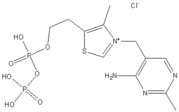Thiamine
Thiamine or thiamin, also known as vitamin B1, is a colorless compound with chemical formula C12H17N4OS. It is soluble in water and insoluble in alcohol. Thiamine decomposes if heated. more...
Thiamine pyrophosphate (TPP) is a coenzyme for pyruvate dehydrogenase, α-ketoglutarate dehydrogenase and transketolase. The first two of these enzymes function in the metabolism of carbohydrates, while transketolase functions in the pentose phosphate pathway to synthesize NADPH and the pentose sugars deoxyribose and ribose. Systemic thiamine deficiency can lead to myriad problems including neurodegeneration, wasting, and death. Well-known syndromes caused by lack of thiamine due to malnutrition or a diet high in thiaminase-rich foods include Wernicke-Korsakoff syndrome and beriberi, diseases also common in chronic abusers of alcohol.
Genetic diseases of thiamine transport are rare but serious. Thiamine Responsive Megaloblastic Anemia with diabetes mellitus and sensorineural deafness (TRMA) is an autosomal recessive disorder caused by mutations in the gene SLC19A2, a high affinity thiamine transporter. TRMA patients do not show signs of systemic thiamine deficiency, suggesting redundancy in the thiamine transport system. This has led to the discovery of a second high affinity thiamine transporter, SLC19A3.
Thiamine was first discovered by Umetaro Suzuki in Japan when researching how rice bran cured patients of Beriberi. He named it aberic acid.
The only known cases of thiamine overdose occurred with thiamine injections.
Read more at Wikipedia.org



